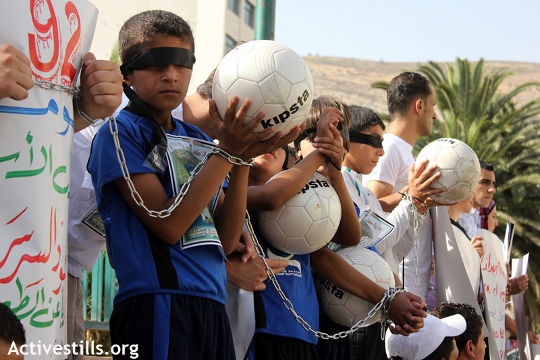When discussing administrative detention with Israelis, there comes a point when the discussion becomes an argument like one about religion — based on blind faith in the security establishment.
By definition, administrative detainees have not committed a crime. An administrative detention order is issued against people (almost all of whom are Palestinians) against whom there is no evidentiary basis to be put on trial. None at all. Because there is no evidence, there is also no indictment, no trial, no opportunity for the detainee to dispute the charges against him, no conviction and no verdict or sentencing to determine the length of a prison term. On the one hand an administrative detainee has committed no crime, and on the other hand, there is no limit to the amount of time he or she can be jailed.
True, there is “judicial oversight” by a military judge — behind closed doors — over the detention orders that are renewed every six months. Anyone who happens to read the protocol of such hearings will figure out very quickly that they are a joke. Shin Bet (Israel Security Agency) agents present secret evidence and and interrogations of the detainee and they refuse to answer any of his lawyers’ questions about the rationale for issuing the detention order. The detainee has no way of defending himself because he does not know of what he is accused. And so people end up in prison — for many years sometimes.
I’ve met administrative detainees — before, during and after they were held in administrative detention. Some of them are political activists and protest organizers. Others, like some of those who are currently imprisoned and have been on hunger strike for more than a month now, they are Hamas members of the Palestinian Legislative Council. Some of the detainees are sick or elderly. And there are others, like Palestinian soccer player Mahmoud Sarsak, who was imprisoned for three years without ever being indicted and was released only after launching a three-month hunger strike. It is not known, nor has it been published exactly how he threatened or harmed Israeli state security.

Despite it all, and despite the fact that two years ago Israel committed to reducing the number of administrative detainees as part of a deal to end a mass hunger strike (it did reduce the number for about a year — and then started using administrative detention orders again), and despite the fact that over 100 administrative detainees have been on a hunger strike for more than a month and many of them have been hospitalized — there is no serious cry to release them and to put an end to the use of this anti-democratic tool.
Some of that silence, of course, stems from the wider lack of of interest in the occupation in general, in every regard. Aside from a shocking video here or there, or another fictitious round of “peace talks” (this time they called it a process), Israelis don’t really care what happens in the occupied territories. And the media also reflects that lack of interest.
But the issue of administrative detention diverges from the political plane and crosses into the realm of religious-like faith that Israelis have in the security establishment. Time after time, facts are exposed, like those with which I started this article, and every discussion is met with the same answers: “they don’t just lock people up for the hell of it”; “they’re not angels”; “nobody locks people up for fun,” and; “if they’re in jail they must have done something [wrong].”
Those are empty phrases, unfounded statements, not based on any specific piece of information about a specific detainee, about administrative detainees in general, or about the Shin Bet and army’s decision-making process in issuing administrative detention orders. They are phrases that fail to consider the possibility that this is an unacceptable practice, bad judgement in the best case (a naive conclusion), or a tool of political oppression in the worst case (the actual case). But never that Shin Bet interrogators are simply lying.
People who say such things don’t want to actually confront the meaning of administrative detention, of imprisoning hundreds of people without trial in a country that presents itself as a democracy. And so they simply choose to believe — with their eyes covered — that the “forces of good” in the security establishment act only in order to protect us, day in and day out, from the “forces of evil,” the Palestinians who are trying to hurt us.
There are no humans involved, no criminal procedures, nothing. Just faith. Try arguing with that.
Read this post in Hebrew on Local Call.
More on administrative detention:
Israel admits: Administrative detention unnecessary
Hunger-strikers are another statistic in an unjust legal system
Administrative detention: Months or years without due process


